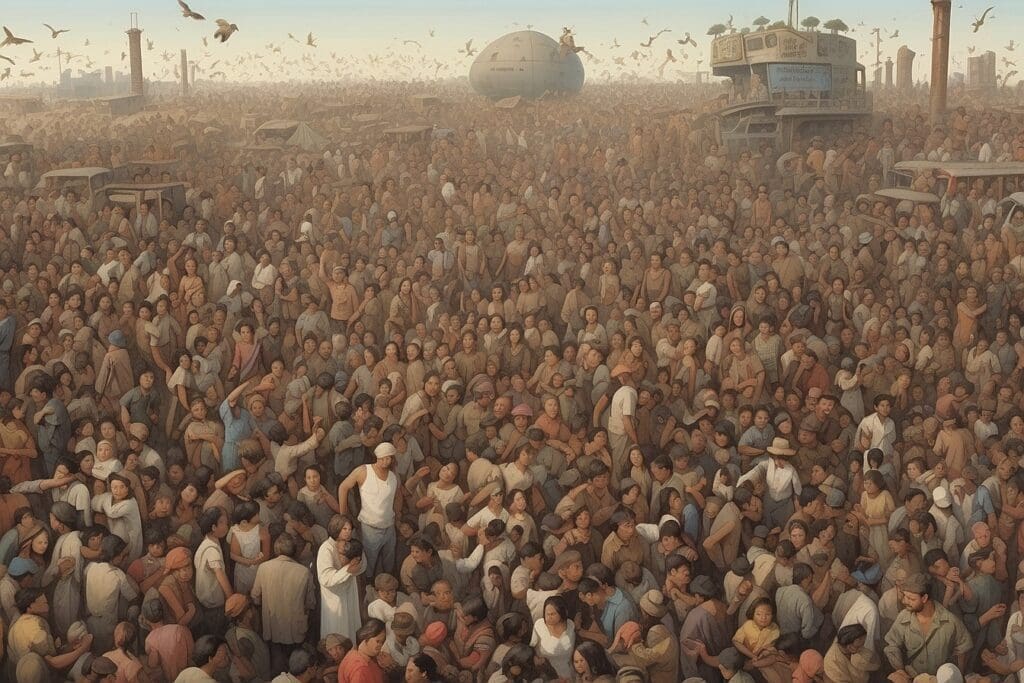All environmentalists want to curb the effects of wasteful and damaging human activity on the environment, but some environmentalists believe the root of major environmental problems is simply the rapid growth in the number of humans on Earth. This phenomenon is otherwise known as overpopulation. As demonstrated by the recent food crises, energy crises, and resource disputes, people have already experienced the strain on the earth’s natural resources. At the same time, the world’s population continues to grow by the billions.1
Overpopulation is strongly correlated with the monumental changes of the planet’s forests, fisheries, and atmosphere, says Robert Engleman of Population Action International.2 While industrialized countries with more economic resources tend to have declining populations, poorer countries without the infrastructural capacity to deal with population growth are experiencing it the most.3 The United Kingdom’s chief government scientist predicts that, by 2030, global population growth will create a perfect storm of food, water, and energy shortages.4
However, other environmentalists strongly criticize the theory of overpopulation, pointing to a similar theory which had been once proposed by Thomas Malthus in 1798. Malthus had argued that, people were reproducing exponentially and that agriculture could only advance at a linear pace, which would lead to an imminent food shortage and decreasing standards of living for everyone. Because of this, he proposed that there should be no food subsidies for the poor, since population would only be significantly reduced by the famines produced from too much demand on too little resources. Contrary to his prediction, even as birth rates increased, living standards actually increased, thanks to advances in agricultural and industrial production.5
Many Neo-Malthusians have continued this same argument. Paul Ehrlich predicted massive famine in the 1970’s, then again in the 1980’s, neither of which occurred due to advances in technology. Instead, environmental critics counter, not that famines and natural resource depletion cannot occur, but that they are not usually correlated with population increases.6 In fact, the world today technically produces more food per-capita than at any point in human history, but now 70-80% of the world’s grains are fed to livestock, catering to the world’s ever-growing appetite for meat.7

This isn’t just a problem with crops; most of the world’s depleting natural resources, such as clean water, energy, and land, are being consumed by the world’s most industrialized nations.8 For example, while 1.1 billion people lack access to safe drinking water, 12% of the world’s richest citizens are using up to 85% of the world’s clean water. Despite often being in water-rich regions, the poor often pay more for water than the rich.9 Therefore, these environmentalists counter, the real problem is not of physical limits on resources but of resource distribution. Most of the world’s natural resources are exported right out of poorer countries to consumers in developed ones.10
On the other hand, some counter that policymakers cannot ignore the role of population entirely. Even if, for 20 years, the world completely stabilized its per-capita energy consumption and North America and Western Europe cut their per-capita energy consumption in half, the population would still grow such that energy consumption would just be the same as it is now.11 Even this is optimistic, since as poorer countries develop their economies, their consumers begin to use resources at rates similar to consumers in more developed nations.12 If the worst-case scenario happens, and efficiency gains or alternative resources can’t make up for the gap this time, there is a possibility that resource prices could spike, which could cause untold economic and social consequences.
Fortunately, demographers are starting to have some idea regarding why birth rates go down. On one side, people without a social safety net tend to want to have many children who can support them economically in old age or in case of illness. On the other, educational opportunities for women allow them to pursue their own careers, delay marriage, and have more control over when they want to give birth. If their children have better healthcare and a higher chance of survival, women are more content with having fewer kids.13 All of these benefits should be pursued in their own right, and if they are, they may drastically reduce population growth.
Unfortunately, an over-emphasis on population control can sometimes lead to more drastic and detrimental methods. As Malthus proposed, when families are so poor that they cannot afford to have kids, they will try not to. Birth control has been advocated even when it would be economically detrimental for families to do so, leaving them without a family safety net. Worst of all, even as recent as the 1990’s, countries like Peru forcefully sterilized over a hundred thousand of its poorest citizens.14
That is why it is so imperative that environmentalists determine exactly how much of an impact population growth will have on the environment. Blaming resource scarcity only on population growth has proven faulty, but ignoring it completely can be just as irresponsible. This issue only reinforces the idea that the environment cannot just be treated as an afterthought in economics, and vice versa. Rather, they are both intricately intertwined in the complex social and political relations governing our lives.



